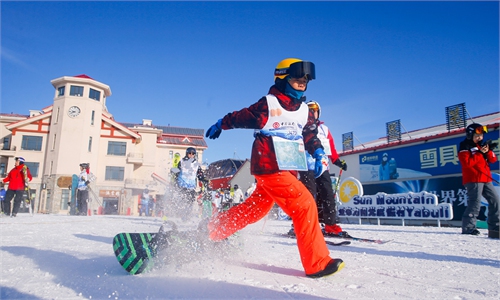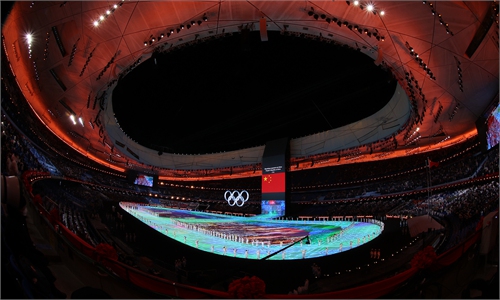Overseas brands eager to cash in on China’s ice and snow economy
Global brands cash in on China’s burgeoning ‘white economy’
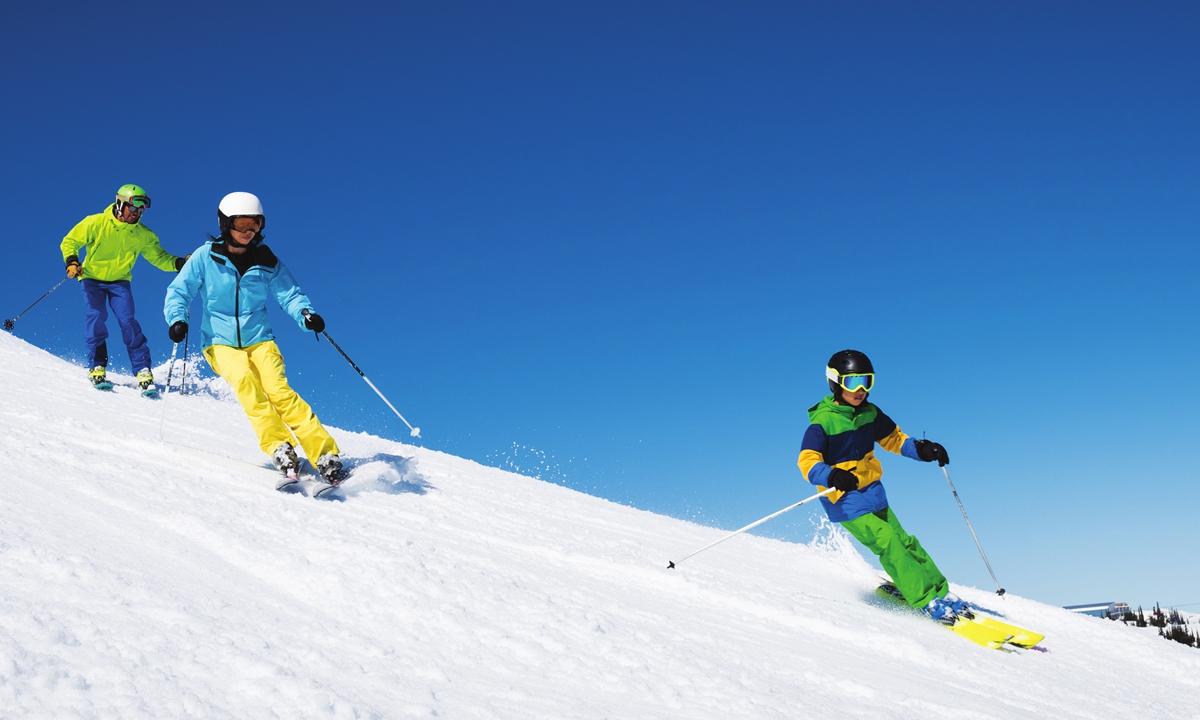
Photo: VCG
Ralph Lauren for US team, Lululemon for Canada, Descente for Japanese athletes, Karbon for Australia... the opening ceremony is not only a stage for sportsmanship and countries' culture, but also a display for global sportswear brands.
Yet, this is just a glimpse of how overseas companies have approached one of the world's largest sports events. So far, a miscellany of international brands, from sportswear, food to education and consulting, have arranged promotional activities related to the Winter Games in various forms, including by sponsoring the Games or launching related products.
And, a growing number of new overseas consumption brands are thronging to China, while overseas industrial giants are pouring money into building facilities, like snow ropeways and ski parks in China, as they see the sports gala as a good showroom for increasingly affluent Chinese customers.
Passion for the Games
According to data collected by the International Olympic Committee (IOC), a number of overseas companies have sponsored the Beijing 2022 Winter Olympic Games. For example, Swiss education company EF Education, and Snickers, a chocolate brand under US food brand Mars, have both become contracted suppliers for the Beijing 2022 Winter Olympics.
Apart from direct sponsorship, overseas companies have also ramped up efforts into designing Games-related promotional campaigns and activities to attract customers' attention, at a time when ice and snow are becoming a buzzword in China.
One example is Italian sportswear brand Fila. The company has recently launched a TV commercial featuring three athletes from China's national freestyle aerial skiing team, while sponsoring the team's outfit at the Beijing Games, according to information sent by Fila to the Global Times.
It is also one of a number of overseas companies that launched a line of products for the Games. For instance, Swiss watch manufacturer Omega designed a special "Beijing 2022" version which will provide timing services for several Winter Olympic matches, while French fashion giant Louis Vuitton launched the brand's first winter sportswear collection recently.
"We want to let Chinese consumers see the brand's competence in professional sports field via the opportunity of the Winter Olympic Games," Brian Yiu, CEO of FILA China told the Global Times.
Besides established overseas brands, many new brands are also entering Chinese market for the first time around the Winter Olympic Games. Recently, Swedish ski brand Peak Performance opened an online store in tmall.com in September 2021, while Austria-based sportswear brand Head opened its first store in China in December.
In recent years, the development of snow economy has given birth to a string of industries related to snow and ice sports, ranging from the construction of supportive facilities like snow ropeways and ski parks, to the sales of ski tools and outfit.
And overseas investors have invested across almost all industrial chains in China's snow industry. For example, two Malaysia-based companies, the VXL Group and the Genting Group, have built a ski resort in Zhangjiakou of North China's Hebei Province, which also became the venue of several Beijing 2022 Winter Olympic Games matches.
Besides, Zhangjiakou city has signed a total of 54 snow-related equipment manufacturing projects by the end of 2021. A number of globally renowned ice and snow equipment makers, such as French ropeway operator MND, Swiss high-end ropeway manufacturing company BMF, and Italian snowmaking firm TechnoAlpin, have launched production lines in the city's snow resorts.
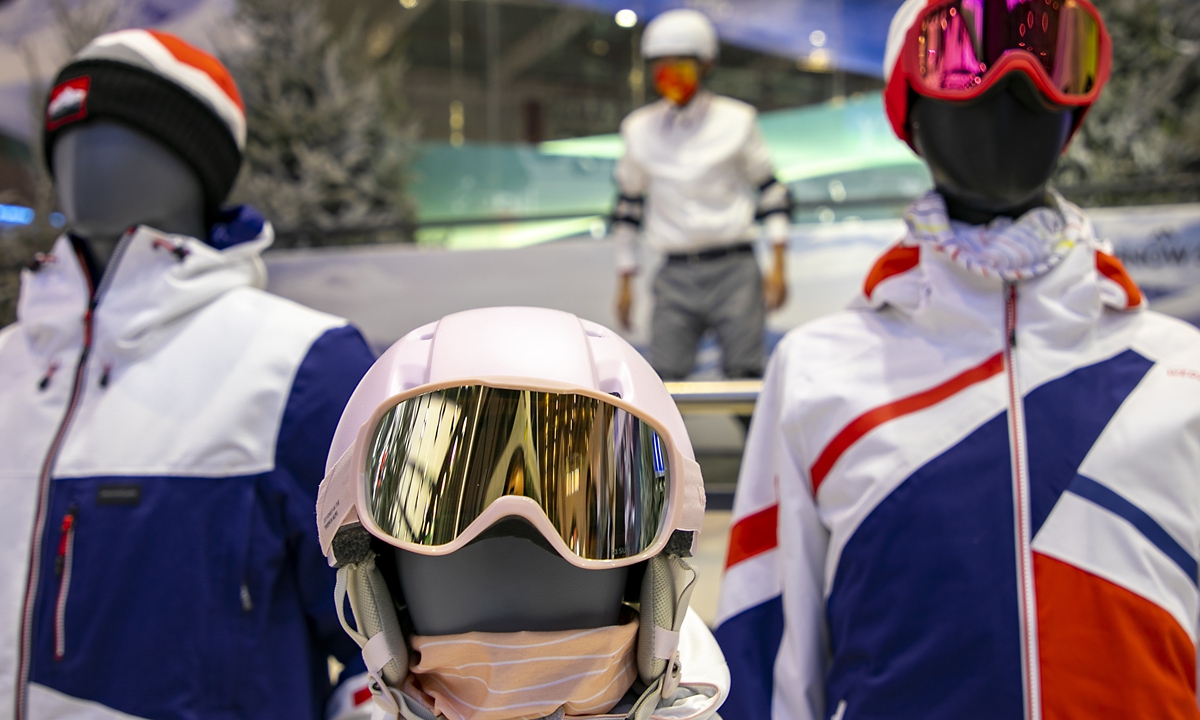
Skiing equipment of Decathlon at the 4th China International Import Expo Photo: VCG
Skiing market
Overseas brands are actively participating in the Winter Olympics-related promotional activities at a time when they saw the high-speed growth of China's "white economy," referring to snow and ice sports.
"The Games is a good opportunity for ice and snow sports to set up a foothold in China... it's a precious chance that China's white economy can have such support as the Winter Olympic Games in its initial stage. We are very confident about the prospects of China's white economy," Yang Zhongxiao, Decathlon China's winter sports development director, told the Global Times via a written statement.
To some extent, the rapid development in China's ice and snow sports consumption has become increasingly pronounced. According to an industry report, China's snow and ice industry has expanded from 270 billion yuan ($42.5 billion) in 2015 to about 600 billion yuan in 2020. The scale may reach 800 billion yuan in 2022, the report showed.

Graphics: GT
"In China, skiing is turning from a kind of extreme sports to a lifestyle, and we are optimistic that a kind of skiing culture will form in China thanks to the Winter Olympic Games," Yang said. "We cherish the current positive environment."
Yiu also said the Winter Games will usher in an opportune development period for China's snow economy, especially in the four years following the Games.
"As the government has raised the goal of letting 300 million people to participate in snow sports, I believe that snow and ice sports will have a promising future, not only among adult Chinese customers but also among young people and children," Yiu said.
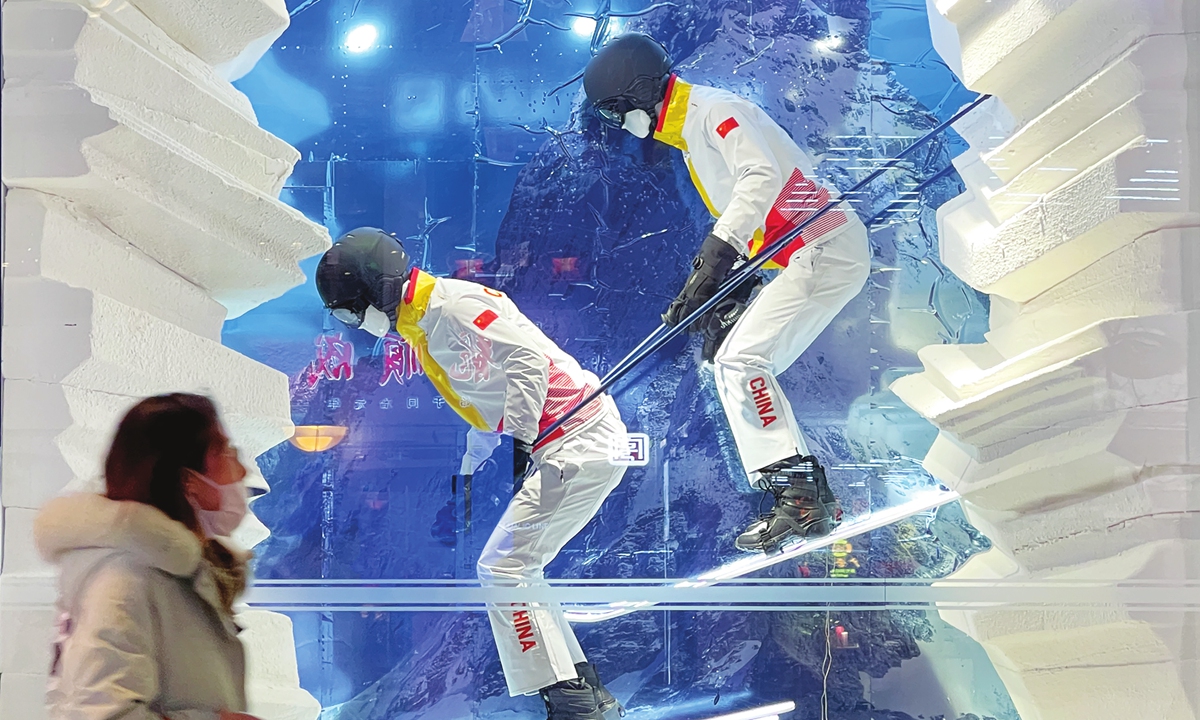
Fila's flagship store in Beijing Photo: VCG
Market appeal wins
Experts noted that the active participation by overseas companies in Winter Olympics-related activities not only reflects the great appeal of China's huge market, but is also testimony that China is committed to market opening-up despite rising protectionism in the US and its close allies.
"China's snow-related market is showing unprecedented potential, which is an excellent development opportunity for both Chinese and foreign companies," Zhang Yi, CEO of iiMedia Research Institute, told the Global Times on Monday.
Zhang noted that overseas brands' move to enter the Chinese market and launch Winter Olympics-related promotional campaigns not only reflect the great attraction of the country's vast consumer market, but also show that China is always sharing its huge market with major global enterprises, despite some foreign media's smearing the Winter Olympics and the US government's silly attempt to "diplomatically boycott" the event.
According to Zhang, after the opening ceremony of the Beijing Winter Olympics, not only the down jacket brands from various countries quickly became popular, but also China has showcased a slew of new and high technologies.
In the future, foreign enterprises could have more chances to strengthen cooperation with China in the service industry including clothing and skiing equipment, in addition to cooperation in high-end technologies including artificial intelligence, 5G and augmented reality.

